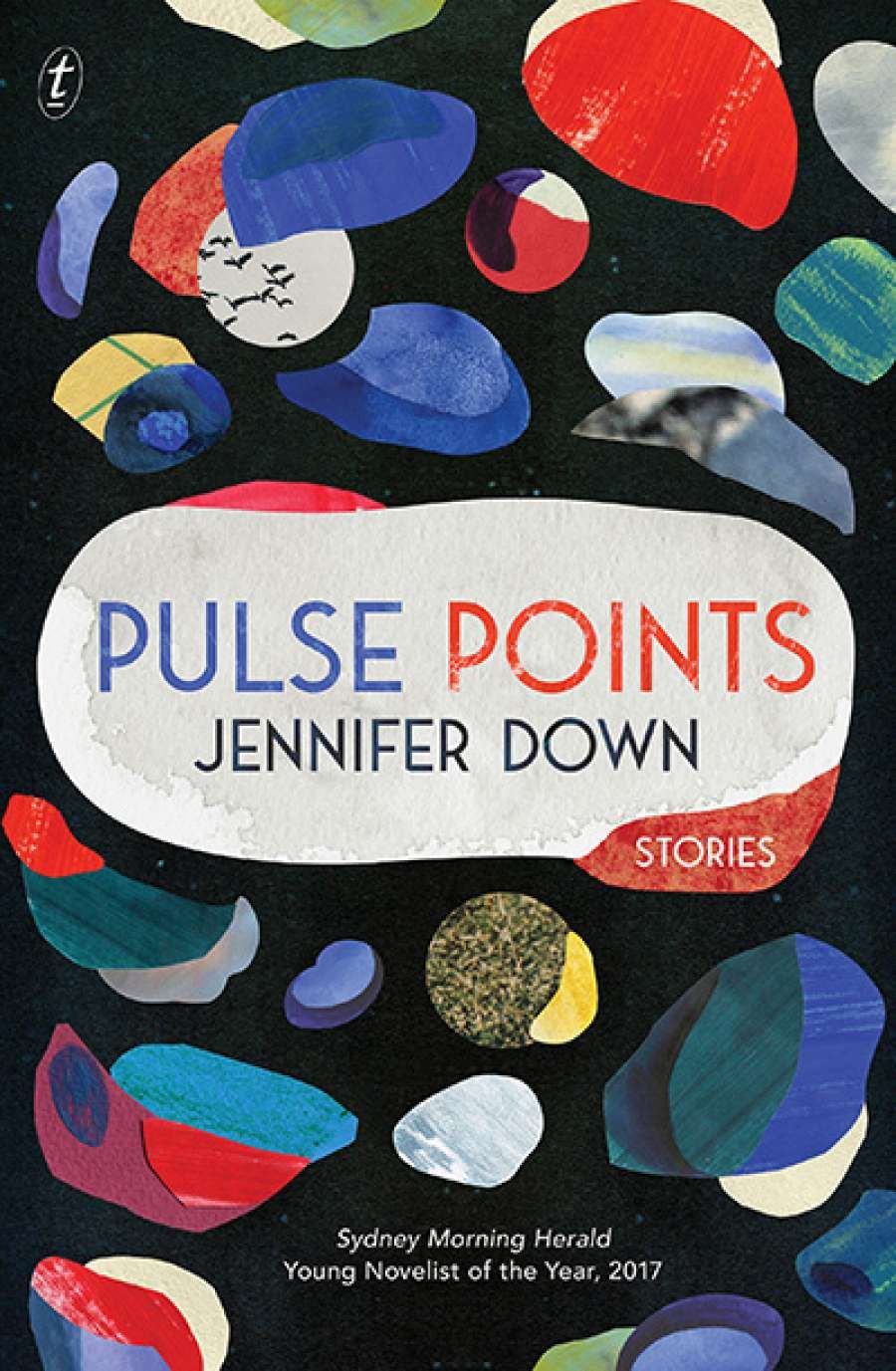
- Free Article: No
- Contents Category: Fiction
- Custom Article Title: Susan Midalia reviews 'Pulse Points' by Jennifer Down
- Review Article: Yes
- Online Only: No
- Book 1 Title: Pulse Points
- Book 1 Biblio: Text Publishing, $29.99 pb, 225 pp, 9781925355970
Other voices require equally attentive listening. The stories throughout the collection offer absorbing acts of ventriloquism: we hear the voices of different genders, sexualities, social classes, and ages, as we bear witness to characters whose struggles for autonomy or connection are often written on the body. There is the girl in the story ‘Vaseline’ who has ‘rage in [her] veins’ but is unsure about crossing the boundaries of her working-class existence. In ‘Pressure OK’, there is the voice of an ageing widower whose seeming equanimity masks feelings of sensorial deprivation and being adrift in the alien world of the young. We hear in the title story the dislocated, increasingly panicky voice of an immigrant gay man unable to articulate a coherent idea of ‘home’. One of the collection’s most disturbing voices is that of a collective misogyny – dismayingly casual, brutally unthinking – in the story ‘Dogs’. Set in country Australia, it is also a tale of unexpected outcomes, with some darkly humorous touches.
The stories are also interested in the emotional dynamics and politics of the family, caught up in the contest between the spoken and the silent. In representing family, Down is particularly skilled at creating the illusion of a larger world beyond the confines of the relatively few words on the page, and at offering moments of affirmation between siblings. Consider the childless sister in the story ‘Peaks’, remote from her maternal sister through experience and education, but finally able to share an exhilarating sense of risk. In ‘We Got Used to Here Fast’, a woman separated from her brother seeks to rescue him from his distressing isolation. The enduring bond between them is suggested by a beautiful metaphor at the emotional and structural heart of the narrative: two children speaking to one another using two small satellite dishes, their words mysteriously amplified, carried across distance and ultimately through time.
The collection also creates a vivid sense of place, both Australian and global, as projections of the inner life, or as ideological sites representing the power, or powerlessness, of various characters. The hiking trail in ‘Eternal Father’ provides a woman with sanctuary from her dead-end jobs and the religious narrow-mindedness of Johnson City, Texas. An airport terminal in ‘Hungry for God’ is a poignant correlative of a man’s muted feelings of regret. Descriptions of Paris in the story ‘Convalescence’, from the confines of an apartment to the unbearable beauty of Sacré Coeur, trace a woman’s increasingly anguished inability to speak her unexpected grief. In the concluding story, ‘Coarsegold’, a woman’s restless movement between American locations parallels her troubled questioning of self and other. What responsibility does she owe to her partner or to the women of her town? Where, if anywhere, might she try to escape? Here, as with the stories as a whole, there are no easy answers. ‘Coarsegold’ is also the collection’s longest story by far, and it uses the more expansive space of thirty-four pages to reveal the most conflicted place of all: the one inside our head.
 Jennifer Down
Jennifer Down
Pulse Points is an impressively poised and even collection. It defies Flannery O’Connor’s famously withering pronouncement that ‘so many people can now write competent stories that the short story is in danger of dying of competence’. Down’s stories are alive with psychological acuity and technical dexterity. They offer thoughtful, sometimes heartbreaking, insights into our anxieties and desires. They demonstrate the value of emotional restraint, and spare, often sub-textual dialogue. They can deploy pared-back but resonant language to create complex effects. Their conclusions are often surprising and sometimes unsettling, but always completely earned. At less than thirty years of age, Jennifer Down has already been awarded prestigious prizes for individual stories, shortlistings for her novel, Our Magic Hour (2016), and named as one of the Sydney Morning Herald’s Young Novelists of the Year for 2017. Readers of her intelligent, subtle, and affecting prose clearly have much to look forward to.


Comments powered by CComment